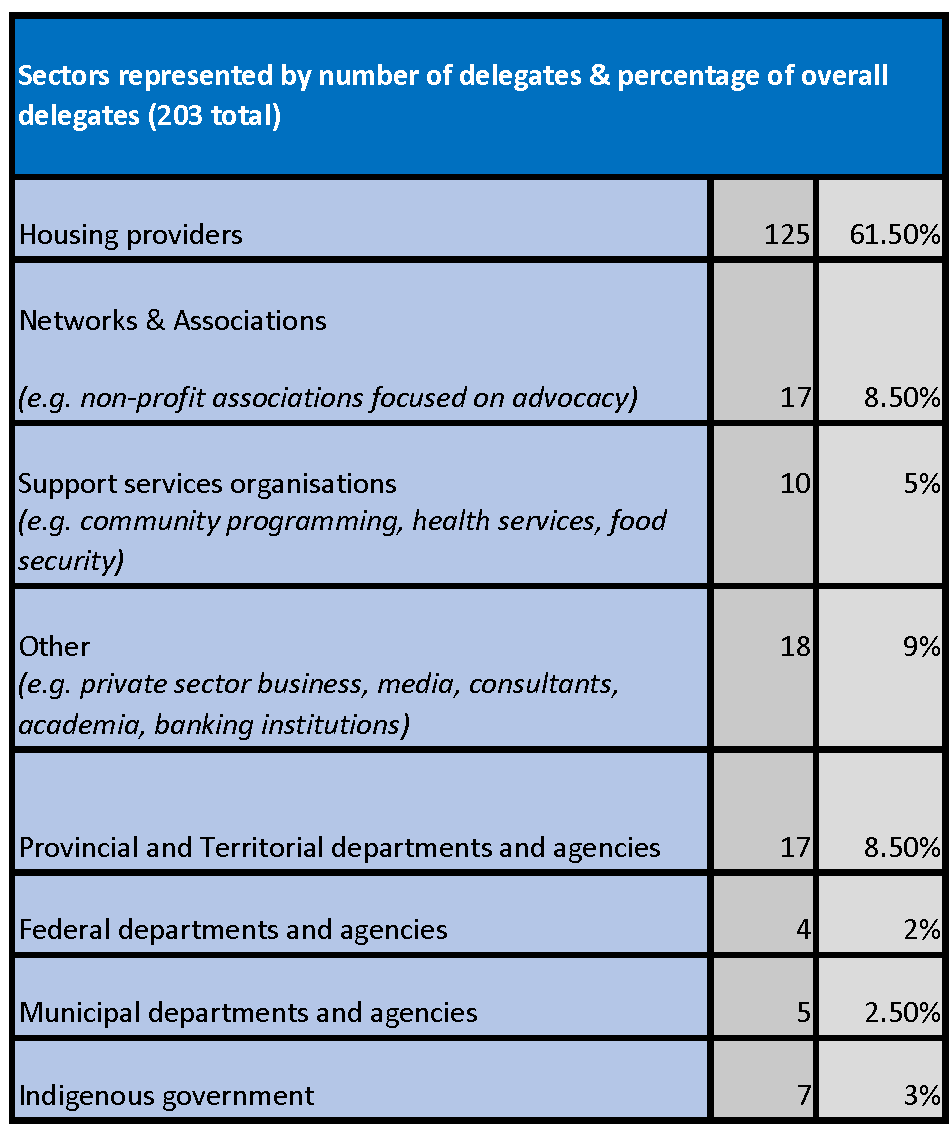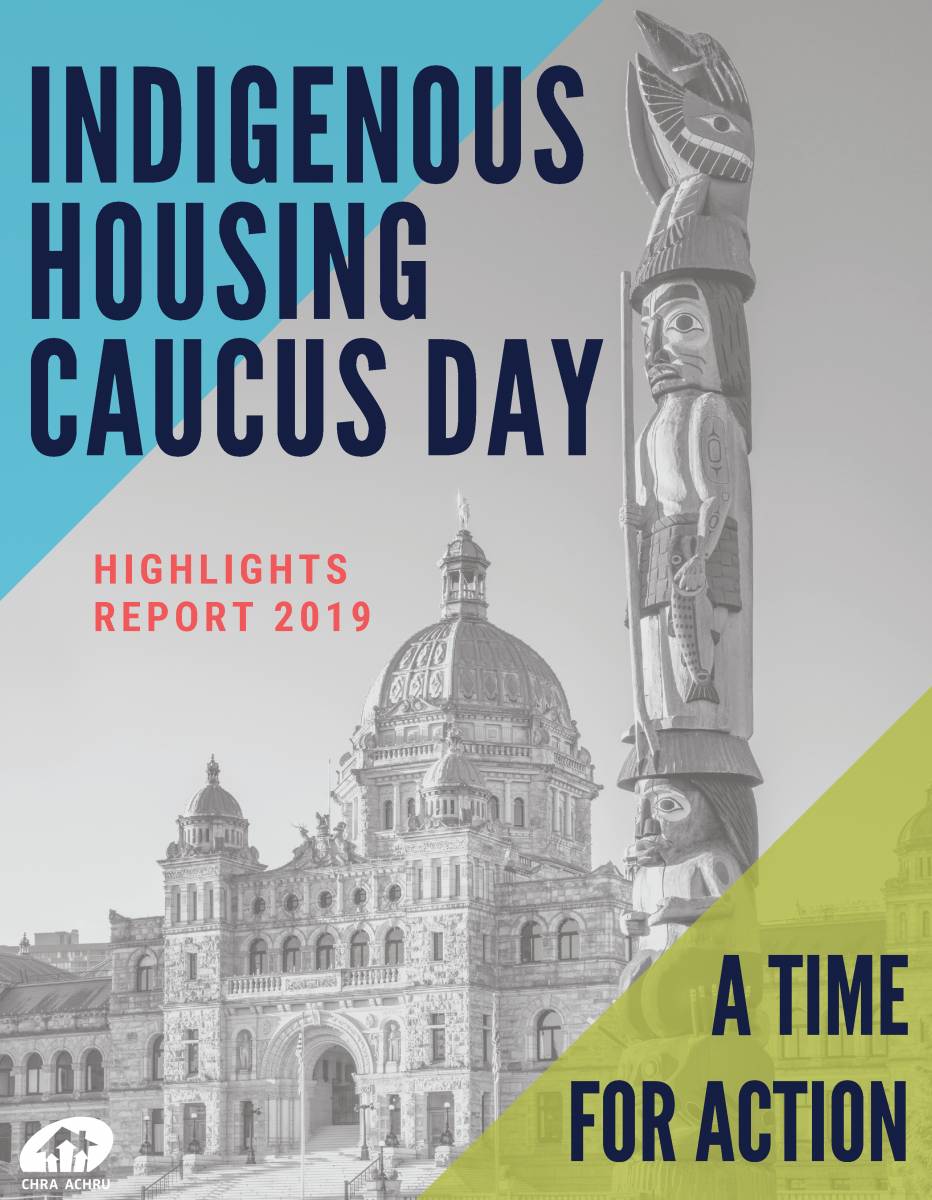 |
|---|
| Download the PDF version |
A TIME FOR ACTION
This report is written with support from BC Housing.
The Canadian Housing and Renewal Association and the Indigenous Housing Caucus Working Group extend thanks to all those who contributed to the success of Caucus Day 2019: Elder Butch Dick of the Songhees Nation; Dr. Gwendolyn Point; Lisa Helps, Mayor of the City of Victoria; Dan Brant and Catherine Irwin-Gibson; interactive session group leads and notetakers; facilitators Kim Haxton and Khari McClelland of IndigenEYEZ; and the 200 delegates who brought their knowledge, passion, and insights to the table on April 2, 2019.
Above all, CHRA and the Indigenous Housing Caucus Working Group acknowledges the generosity of sponsors who made Caucus Day 2019 possible:
Ontario Aboriginal Housing Services
Aboriginal Housing Management Association
Vancouver Native Housing Society
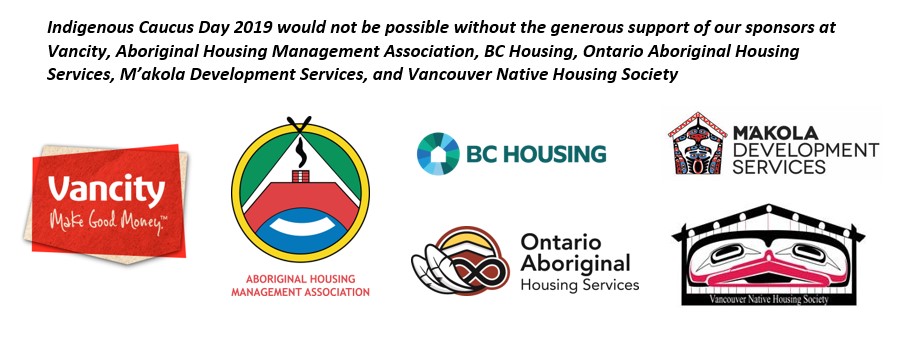
| Quick Links |
|---|
| EXECUTIVE SUMMARY |
| OPENING CEREMONIES |
| A YEAR IN REVIEW |
| SESSION ONE: MAPPING OUR JOURNEY |
| SESSION TWO: OPENING NETWORKING SESSION |
| CLOSING REMARKS |
| WHO WAS IN THE ROOM |
FOREWORD
The Canadian Housing and Renewal Association’s (CHRA) Indigenous Housing Caucus was established in 2013 at CHRA’s annual Congress on Housing and Homelessness in recognition of the large number of Indigenous-led and Indigenous-serving organisations who are CHRA members and wanted to work together for better housing for First Nation, Métis, and Inuit people living in northern, rural, and urban areas. Indigenous housing and homelessness service providers across the country face a number of challenges to which the Indigenous Caucus is responding with resourcefulness, good management and innovation.
Indigenous Housing Caucus Day takes place annually in conjunction with CHRA’s Congress on Housing and Homelessness. It is a full-day collaborative forum attended by over 200 delegates from across Canada, ranging from urban and regional social and non-profit Indigenous housing corporations, local homelessness service providers and regional homelessness coordinators, representatives of all orders of government, and private sector actors in academia and business.
Since 2013, the Indigenous Caucus has grown both in size and influence, becoming a credible body for developing and providing Indigenous policy advice on housing and homelessness. The Indigenous Caucus meets together in person once a year at Caucus Day. Throughout the remainder of the year the interests, feedback, advice, and recommendations communicated on Caucus Day is represented and actioned by CHRA’s Indigenous Housing Caucus Working Group. The Working Group assembles via monthly conference calls to advise and provide Indigenous perspectives on emerging national housing and homelessness issues to CHRA, as well as provide advocacy support and propose research projects exploring various facets of Indigenous housing and homelessness issues.
The Working Group is composed of CHRA members from across the country with an expertise and understanding of Indigenous housing, including tenant support, building operations, cultural issues, and homelessness. Robert Byers, President and CEO of Namerind Housing Corporation in Regina, has served as Indigenous Communities Director on the CHRA Board of Directors, and as Chair of the CHRA Indigenous Housing Caucus since 2013. Other members of the Working Group include:
- Kevin Albers, CHRA Board President, and CEO of M’akola Housing Society and M’akola Development Services
- Pamela Hine, President of Yukon Housing Corporation
- Margaret Pfoh, CEO of Aboriginal Housing Management Association (BC)
- David Eddy, CEO of the Vancouver Native Housing Society
- Richard George, President of the Vancouver Native Housing Society
- Susan McGee, CEO of Homeward Trust Edmonton
- Marc Maracle, Executive Director of Gignul Non-Profit Housing Corporation (Ottawa)
- Justin Marchand, Executive Director of Ontario Aborginal Housing Services
- Christin Swim, General Manager of Skigin-Elnoog Housing Corporation (Fredericton)
- Phil Brown, former CHRA Board President
- Louise Atkins, former volunteer CHRA Indigenous Caucus Coordinator
Caucus activities are supported by CHRA staff Jeff Morrison (Executive Director) and SM Leduc (Manager of Policy and Research, and Indigenous Caucus Coordinator).
EXECUTIVE SUMMARY
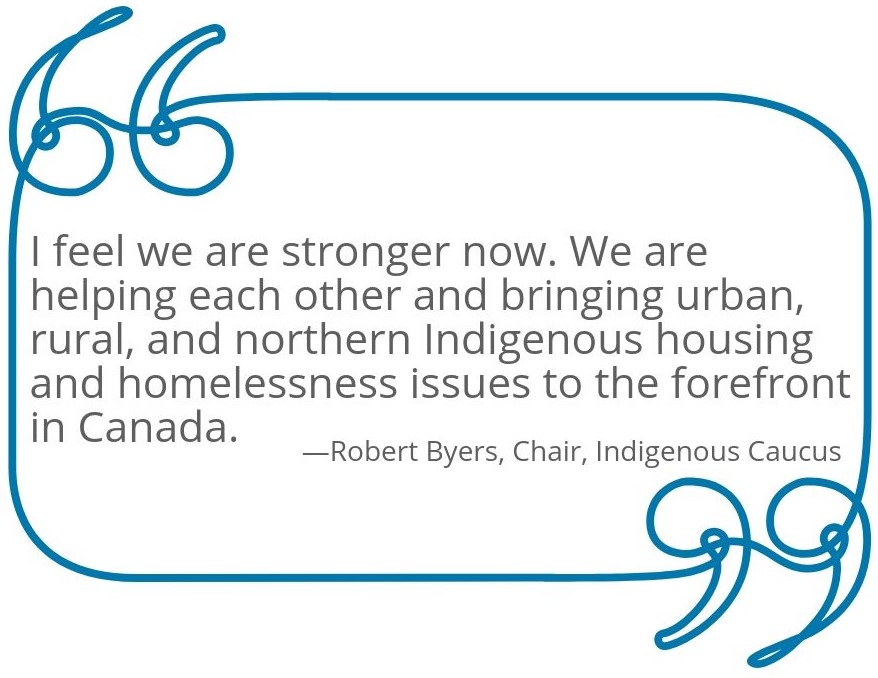 With over 200 delegates in attendance in Victoria in 2019, participation numbers at Caucus Days have continually increased since its inception six years ago, serving to highlight the importance of Indigenous housing and homelessness issues in Canada.
With over 200 delegates in attendance in Victoria in 2019, participation numbers at Caucus Days have continually increased since its inception six years ago, serving to highlight the importance of Indigenous housing and homelessness issues in Canada.
Caucus Day 2019 was focused on this growth, mapping the journey of the Caucus and asking crucial questions about its future in both the short and long term. This Caucus works on incredibly important policy issues and advocates for increased housing programs and services for Indigenous Peoples living in urban, rural, and northern settings.
The Trudeau government has spent a fair deal of its mandate seeking to redress historic harms, advance reconciliation, and raise the standard of living for Indigenous Canadians, but there are still significant gaps to fill, among those secure and affordable housing and homelessness prevention. The federal government may be listening, but until federal dollars are committed, Canadians must hold them to account for their fiduciary obligation to all Indigenous Peoples, regardless of where they live.
In reflecting on how we as a nation can best change the policies and structures that keep Indigenous Peoples on the margins, it is equally important to pause to look back in time. The 1992 report “A Time for Action” prepared by the Standing Committee on Aboriginal Affairs outlined how the government’s housing programs were failing to keep pace with the actual needs of Indigenous Peoples, and more was required to address the crisis.
It would appear the government’s acknowledgement of the Indigenous housing crisis over 25 years ago never translated to a real sense of urgency in committing to doing, and being, better. The data from that report reads as if was written today —overcrowding, mould contamination, deterioration and disrepair of existing stock, and the overall unacceptable living conditions threatening the health and social well-being of Indigenous families and communities.
To that end, the Caucus borrowed the government’s title “A Time for Action” and made it the theme for the Caucus Day 2019 program: an opportunity to come together and have a national voice that will assist in highlighting the urgent priorities of Indigenous housing.
Session One —Mapping Our Journey —laid the groundwork for the day by reflecting on the activities and achievements of the caucus over the last several years, setting the stage for interactive discussions on key issues and initiatives for the future of the Caucus.
Session Two — Come Together: Open Space Networking —generated communication and collaboration, bringing delegates together to share ideas and develop solutions to the various challenges and emerging issues faced as homelessness and housing services providers for Indigenous People.
OPENING CEREMONIES
The Indigenous Caucus was honoured to have Elder Butch Dick of the Songhees Nation provide an opening prayer and acknowledge the traditional territories of the Songhees and Esquimalt Nations.
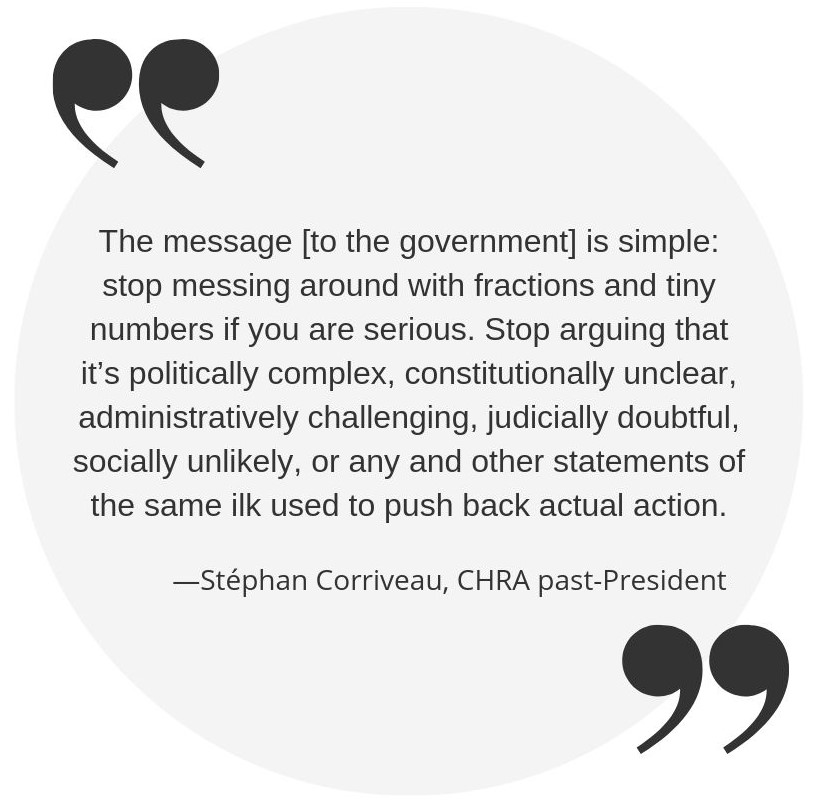 Concluding three years as President of CHRA, Stéphan Corriveau addressed the Indigenous Caucus in this capacity for a final time, noting that, “…no issues that [the CHRA Board] dealt with were both more important, and more disappointing, than the right to housing for Indigenous people. And yet, no other preoccupation gave me more reason to be motivated.” In his poignant opening address, Mr. Corriveau expressed his gratitude to the Caucus for their continued advocacy and determination in improving the standard of living and access to rights for Indigenous Peoples. He challenged the current status quo and lamented the defences used by governments in their inaction to redress historical harms, while pointing out the insincerity of claiming that the governments’ relationship with Indigenous Peoples is most important.
Concluding three years as President of CHRA, Stéphan Corriveau addressed the Indigenous Caucus in this capacity for a final time, noting that, “…no issues that [the CHRA Board] dealt with were both more important, and more disappointing, than the right to housing for Indigenous people. And yet, no other preoccupation gave me more reason to be motivated.” In his poignant opening address, Mr. Corriveau expressed his gratitude to the Caucus for their continued advocacy and determination in improving the standard of living and access to rights for Indigenous Peoples. He challenged the current status quo and lamented the defences used by governments in their inaction to redress historical harms, while pointing out the insincerity of claiming that the governments’ relationship with Indigenous Peoples is most important.
For his continued support of and friendship to the Indigenous Caucus, Mr. Corriveau was presented and honoured with a star quilt by Caucus Chair Robert Byers. “He understood how important our work is as Indigenous housing providers and homelessness services”, said an emotional Mr. Byers. “He deeply appreciated the fact we were providing good housing and services…He’s used his leadership as CHRA Board President to always speak of us first and to drive home the point that there can be no real National Housing Strategy if there is no Indigenous Housing Strategy that includes and empowers urban, rural and northern Indigenous people and their housing organizations.”
Reconciliation is rethinking and rebuilding a relationship between Indigenous People and Canadians. Unfortunately, when it comes to our Indigenous people, our Canadian history is full of pain —but it is also filled with hope for the future. Creative movements and projects are taking place all over Canada and Caucus delegates heard two keynotes speak to reconciliation in action. Lisa Helps, Mayor of Victoria, greeted the Caucus and shared information on the city’s collaborative initiatives with local First Nations, the Songhees and Esquimalt, such as the Witness Reconciliation Program. Dr. Gwen Point, a well-respected Stó:lō leader, mentor, and cultural advisor, and former Chancellor for the University of the Fraser Valley also spoke to Caucus delegates about the meaning of understanding Indigenous histories and taking the time to seek different perspectives as a way of advancing reconciliation.
A YEAR IN REVIEW
Reflecting on the activities and achievements of the Indigenous Caucus since meeting in April 2018 for the Indigenous Housing Caucus Day in Ottawa
APRIL 2018
A Resolution to Support an Urban, Rural, and Northern Indigenous Housing Strategy is passed at CHRA’s Annual General Meeting, calling on the Government of Canada to develop a strategy that would set forth an objective of raising the standard of Indigenous housing to that of non-Indigenous Canadians within the next 10 years.
MAY 2018
The For Indigenous, By Indigenous (FIBI) National Housing Strategy is released and shared with the federal government. Based on two years of input and advocacy from Caucus, the 30-page paper proposes a set of program elements — from protecting current social housing stock and tenants, to greatly increasing the supply of new housing — and asserts the right of urban, rural, and northern Indigenous people to have recognition and standing to negotiate and deliver programs. The creation of a National Indigenous Housing Centre is recommended as the vehicle to undertake this work.
JUNE 2018
Attended an Urban Indigenous Housing Think Tank hosted by Indigenous Services Canada. Met with the federal New Democratic Party’s Critics for Housing and Indigenous Services to give an overview of urban, rural, and northern Indigenous housing in Canada.
JULY 2018
Met with then-Minister of Indigenous Services Canada, Jane Philpott to discuss a range of issues related to Indigenous housing in Canada. The Minister expressed commitment to taking action to address Indigenous housing and homelessness. She was interested in the recommendations put forward in the FIBI paper and raised a number of key issues, including access to financing and the role of research and data. The Minister reiterated that the meeting was a first step and looked forward to continued dialogue on the subject.
AUGUST 2018
Met with the Deputy Minister of Indigenous Services Canada to discuss FIBI. The Deputy Minister was supportive of approaches to develop a business case and the supporting evidence that identifies gaps in the policy and needs areas for an urban, rural, and northern Indigenous housing strategy. Stemming from that meeting, CHRA’s Indigenous Housing Caucus receives a $189,000 research grant from the Canada Mortgage and Housing Corporation and Indigenous Services Canada to identify issues most prevalently affecting urban, rural, and northern Indigenous housing service providers.
Attended a think tank session hosted by the Assembly of First Nations in Ottawa to discuss the progress to date on their draft 10-Year First Nations National Housing and related Infrastructure Strategy. In recognizing their lack of knowledge on, and meaningful outreach and engagement with, urban, rural, and northern First Nations housing providers, the AFN began consulting with urban specialists in a bid to understand the scope of off-reserve First Nation housing.
SEPTEMBER 2018
The first edition of CHRA’s new Indigenous Quarterly newsletter is published in an effort to better communicate Caucus-led initiatives, advocacy activities, and other Indigenous-specific housing and homelessness news throughout the year.
Took part in the the Australian Housing and Urban Research Institute’s Canadian Housing Study Tour (involving senior housing and homeless officials from Australian state and territory governments to gain insight into Canada’s housing system) to discuss the state of Indigenous housing and provide a site visit of Gignul Non-Profit Housing Corporation properties, which offers housing to low-income Indigenous individuals and families in the Ottawa area.
Appeared before the federal House of Commons Standing Committee on Finance to discuss items for consideration for the 2019 federal budget. In response to the Committee’s annual call for budget recommendations, CHRA submitted a written brief with four specific recommendations, one of which included the development and implementation of an urban, rural and northern Indigenous housing strategy.
OCTOBER 2018
At CHRA’s annual Housing on the Hill Day, Indigenous housing providers across the country met with housing leaders and politicians, including the Minister of Indigenous Services Canada, to discuss the pressing need to address urban Indigenous housing and homelessness in Canada. The advice given to Indigenous delegates was to take a more prescriptive and active political approach on the FIBI proposal to elevate the issue more broadly with parliamentarians.
NOVEMBER 2018
Met with the Canada Mortgage and Housing Corporation Board Chair, Derek Ballantyne, to share the FIBI proposal and take stock of CMHC’s changing role on Indigenous housing. In addition, Mr. Ballantyne underlined the importance of highlighting the capacity of urban providers in future CMHC communication pieces.
DECEMBER 2018
As part of the Caucus research grant, consulting firm Daniel J. Brant & Associates is hired and a national survey is sent to all urban, rural, and northern Indigenous housing providers.
Met with Canada Mortgage and Housing Corporation CEO and President, Evan Siddall, to discuss the status of a strategy for urban and rural Indigenous housing. The meeting followed public comments made by Mr. Siddall regarding the “active political discussions” among senior federal political officials on the development of such a strategy. Although Mr. Siddall could not provide more details on the substance of his previous remarks, he reassured the Caucus that the federal government was actively looking at options to support urban, rural and northern Indigenous housing, and the input of the Caucus, including the FIBI paper were helpful in that regard.
JANUARY 2019
On the heels of the Canada Mortgage and Housing Corporation’s announcement of a new corporate objective —that by 2030, every person living in Canada will have access to safe and affordable housing that meets his or her needs —CHRA Executive Director, Jeff Morrison pens an op-ed outlining some of the challenges the federal government will need to address to meet that laudable goal, including using the FIBI proposal as a roadmap to develop a dedicated urban, rural, and northern Indigenous housing strategy.
FEBRUARY 2019
Federal Social Development Minister, Jean-Yves Duclos and the new Indigenous Services Minister, Seamus O’Regan announces a $638 million investment to address homelessness and housing for Indigenous people living in cities and urban areas. However, of that funding, over two-thirds will go to the government’s homelessness strategy, and no new monies were earmarked directly to housing providers. In an interview with CBC News following the announcement, Caucus member and Indigenous housing provider, Marc Maracle noted that the biggest housing challenge for Indigenous people is affordability and that the focus on homelessness in the funding ignores the real root of the problem, especially since half of the Indigenous population in Canada lives in urban centres where housing is often expensive.
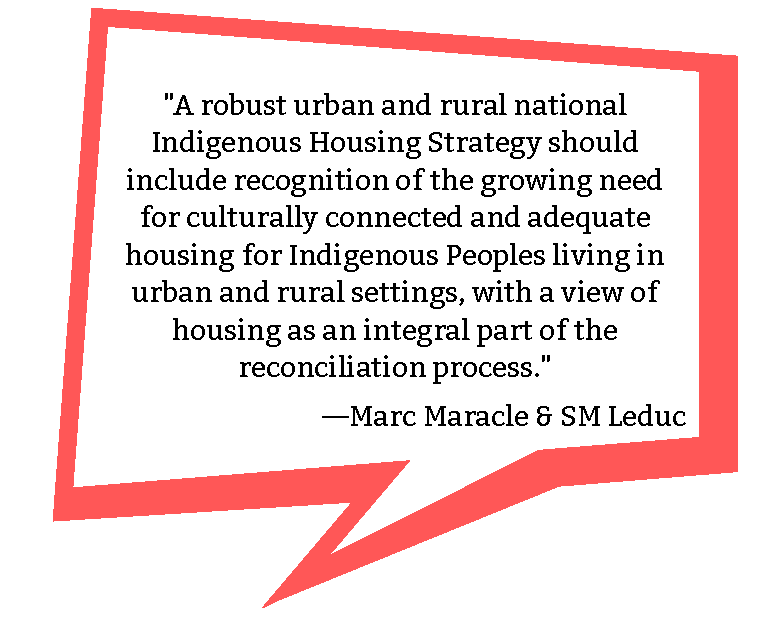
MARCH 2019
Caucus members Marc Maracle and SM Leduc co-author an op-ed on the state of housing of Canada’s urban Indigenous population. The key message from the piece suggests that the federal government must be mindful in how it undertakes major policy shifts and in the emerging political momentum on tackling the Indigenous housing crisis and homelessness, urban and rural Indigenous stakeholders cannot be an afterthought in the process.
It has been another busy year for the Caucus Working Group, with no plans to slow down advocacy efforts. Some critical questions for the federal government still remain unanswered: What federal dollars have been transferred to provincial and territorial governments to address urban, rural and northern Indigenous housing interests? Will the bilateral housing agreements with the provinces and territories explicitly protect existing dollars, or increase funding, for Indigenous housing?
Following Caucus Day 2019, the Working Group will send a request to meet the new Minister of Indigenous Services, Seamus O’Regan, to discuss the outcome of Caucus Day and the findings from the research grants on urban, rural, and northern Indigenous housing.
SESSION ONE: MAPPING OUR JOURNEY
The session focused on mapping the journey of urban, rural, and northern Indigenous housing advocacy since the 1970s and reflected on the creation of the Caucus in 2013. Building on the momentum of the last several years, Caucus delegates were asked, “What’s next? Where do we go from here?”
The goal of the Indigenous Caucus Working Group has been to broaden network visibility and continue to build credibility. This was done by educating politicians and decision-makers at the national and regional levels about the housing needs of urban, rural and northern Indigenous households and the critical role the Caucus plays in meeting these needs.
In pressing for recognition and a “For Indigenous, By Indigenous” vision of a National Housing Strategy for urban, rural, and northern Indigenous people, the Caucus Working Group received $189,000 in funding in 2018 as part of a collaborative federal research grant from the Canada Mortgage and Housing Corporation and Indigenous Services Canada to identify issues —such as operating agreements, waitlists, and housing management —most prevalently affecting urban, rural, and northern Indigenous housing service providers. Indigenous consulting firm Daniel J. Brant & Associates were retained to complete the project and provided a debrief of their findings to Caucus delegates.
Following several months of census surveys and interviews, the Brant Report documents, among other things, an infrastructure inventory, including conditions of housing units across the country, and outlines financial operations. The Report concludes that the federal government should establish and fund a National Indigenous Housing Centre, with a mandate to address operational and support service issues faced by urban, rural, and northern Indigenous housing providers that enables transformational change to benefit the sector and foster reconciliation.
Acknowledging that urban, rural and northern Indigenous housing is not effectively addressed by current federal policies and gaps exist, the results from the project will help inform CHRA and Indigenous Caucus calls for increased and improved services and supports.
Working off this framework, delegates broke off into discussion groups and were asked to give direction to the Indigenous Caucus Working Group and to provide their thoughts and feedback on the future of the Indigenous Caucus. Urban, rural, and northern Indigenous housing have many pressing issues —everything from saving current housing stock and keeping it affordable, regenerating housing and rapidly increasing social and affordable housing units, to getting good data and a fair share of funding resources at federal, provincial and local levels.
What follows is a summary of the ideas that were captured by the over 20 notetakers and discussion leads throughout the discussion session. These discussions not only serve delegates in helping them make connections and network but are particularly instrumental in helping structure the CHRA’s Indigenous Caucus Work Group workplan for the coming year.
As Caucus Delegates, what are your top two priorities for action in the next 12 months? What is your direction to the Indigenous Caucus and the Working Group to get this priority recognized and acted on nationally? Delegates identified the following topics as priorities for action:
- Succession planning and end of Operating Agreements
- Increasing housing stock and land acquisition
- Finding and developing alternative revenue streams, such as social enterprise
- Leveraging resources to achieve social equity
- Accessing funding for sustainable (green) technologies
- Collecting data for better management and program planning
- Building organisational capacity
- Recruiting, retaining, and training qualified staff
- Creating learning opportunities with other housing organisations (both Indigenous and non-Indigenous)
- Briefing community and governments to help create awareness and develop partnerships
- Creating and influencing political will
- Growing services provided to tenants
- Serving (in a holistic manner) and developing programing for women and their children
- Providing better services to youth
- Improving relationship and communications with tenants
Delegates identified the following general activities for the consideration of the Caucus Working Group:
- Establish regular meetings or briefing with the federal government to raise and elevate the issues faced by urban, rural, and northern Indigenous housing and service providers. New infrastructure is being developed with little experience from the distinctions-based groups where urban providers have the experience and knowledge. Government needs to be made aware of this disconnect.
- Set up meetings to discuss and collaborate with distinctions-based groups. As it currently stands, there is little to no connection from distinctions groups with urban housing organisations, meaning there lacks accountability of how federal funding to develop housing strategies is being spent and deliverables reported.
- Distinctions-based groups received large amounts of funding for their housing strategies; however, this funding has yet to trickle down to the urban and rural housing organisations, even those that are more distinctions focused (Métis housing groups).
- Clarify with each distinction group their mandate and find possible ways to work together.
- Discuss succession planning (including funding and program structures and allocation, future of subsidy levels, and continuation of Operating Agreements) with all levels of government. Draw links with economic savings (investment in housing lowers costs in other services) and broader political mandates (EOA will lead to economic evictions and increases in homelessness and precarious housing situations for vulnerable people, especially women and children).
- Communications:
- Making conferences and learning opportunities more accessible through technology such as live streaming
- Increase frequency and improve two-way communications between Caucus delegates and Working Group throughout the year. Stay in touch, ensure consistent communication with housing/service providers. This will also help build a healthy sector relationship and trust that empowers Indigenous communities
- Develop high-level sharable communications pieces for meetings and debriefing (key messages and recommendations)
- More practical communications on research and available funding resources
- Research for better advocacy purposes, including sharing and/or developing:
- Identifying and understanding the working relationship between the different levels of government (F/P/T/M) and with/between the distinctions-based groups, and identifying who is leading processes
- The unique issues faced by northerners (including high cost of living and development), and not lumping the North together with urban and rural. The role of Self-Governing First Nations and whether they would be an ally/partner on work the Caucus undertakes
- Identifying regional challenges between provincial jurisdictions (and sharing best practise models and practical housing solutions) which will help the federal government understand regional contexts
- Gaps analysis on how current funding and program structures exclude some demographics (such as women)
- Costing exercise to understand the state of urban and rural housing, such as current conditions of building and associated costs with their repair or rebuild, as well as asset values
- Home ownership models for those ready to leave community housing
- What is Indigenous housing? Importance of ceremony and explaining culturally appropriate services and learning (what are activities offered and how do tenants get involved)
- Vacant land database or information
- How community housing can use and/or access funding for environmentally sustainable technologies
- Best practises and lessons learned from international Indigenous housing organisations or groups
- Housing First models and Indigenous housing
- Stories of economic evictions and potential increase of homelessness in Canada as advocacy tool that crosses several key government initiatives
Other issues brought forward in the discussions:
- Consultation fatigue. Feeling that there is duplication in data requests from consultants and government.
- Simplifying data. The Brant report survey was overwhelming and time consuming. Tried to do too many things with one research report.
- Harmonizing efforts. More alignment is needed at the provincial and federal levels to reduce risks and challenges placed on housing sector.
- Central supports. Federal government needs to identify ways to streamline political supports (funding and programming) to ensure everything works together cohesively. Having a centralized housing body that oversees all providers and holds them accountable consistently.
- Taking action. Sense that the Caucus delegates discuss same topics every year with little to show in improvement. More proactiveness on previously identified priorities and issues.
- Sense of urgency. Concern that Indigenous issues will fall off the federal radar leading up to the election; engagement with all political parties necessitated.
What are the core components of a solid work plan to develop for this Caucus?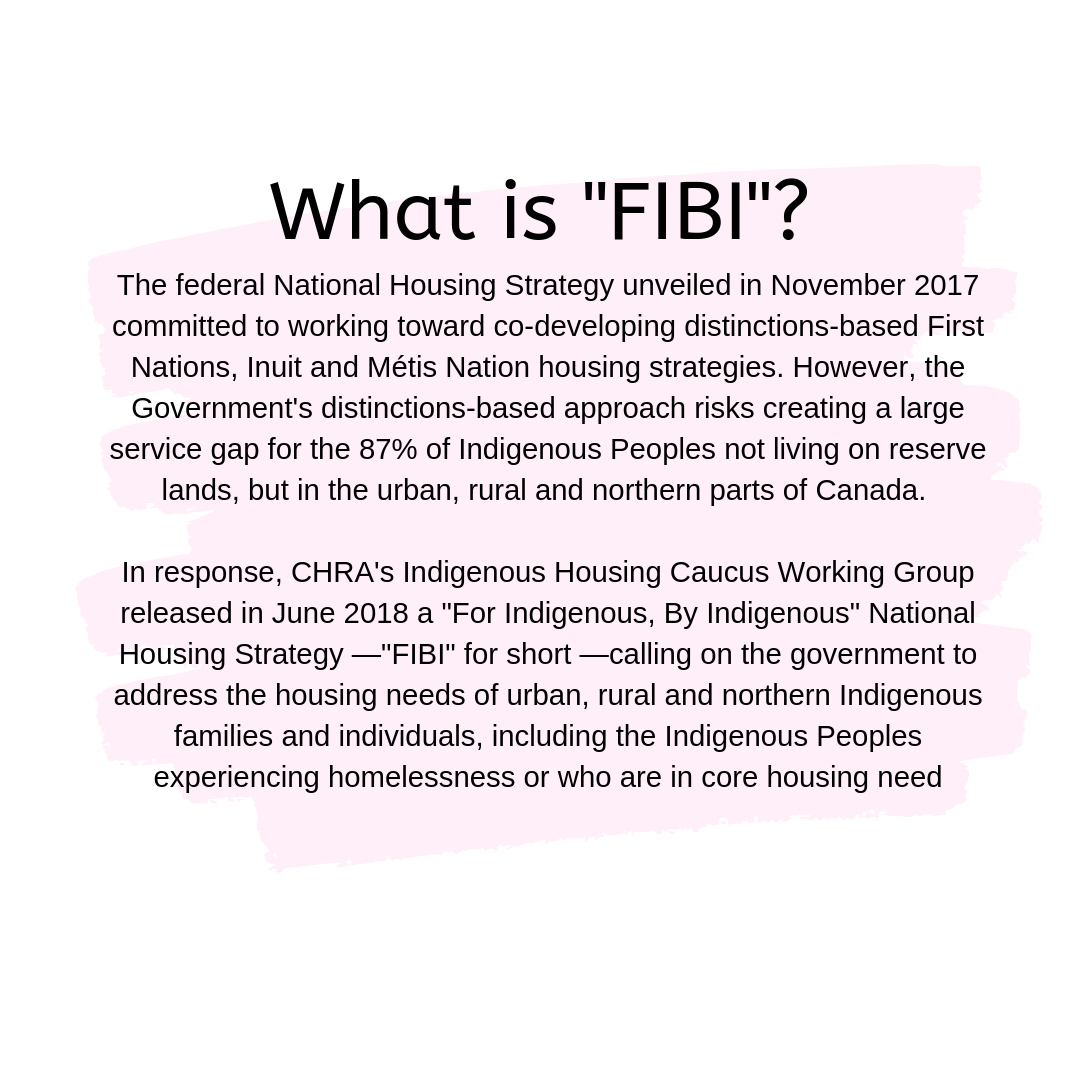
- Advocacy —create clear and consistent external communications that prioritize key messages from meetings with urban, rural, and northern Indigenous housing providers and direction from Caucus Day
- FIBI proposal —still missing are concrete timelines, an effective and realistic process to guide the proposal forward, provide sense of urgency of current Indigenous housing landscape, formal business plan (moving from aspirational to concrete), seek proposal endorsement (including external organisations and groups)
- Networking opportunities—missing a year-round forum or space to share experiences and challenges
- Increase partnerships —seek external partnerships such as philanthropic groups and businesses
- Political organisations —need political Indigenous organisations to stand alongside the Caucus. The Caucus should be the bridge between these political organisations and Caucus delegates
- Strategic plan —create a realistic national-level plan with timelines, deliverables, and communication mechanism
- Communications plan —better two-way sharing of information and resources for on/off reserve migration, particularly with rise of Indigenous urbanization
- Frequency of gathering —annual Caucus Day is not enough. Organise other meetings and activities throughout the year (e.g. dedicated Hill Day with additional activities)
- Additional resources —advocate and seek resources to address Caucus plans, including funding through grants and research monies and dedicated staffing
- Governance —develop Terms of Reference and process for inclusion on the Working Group before the next federal election, so Caucus is ready to go once new Cabinet is put in place
- Each province and territory should be represented to better reflect the challenges each faces. Allow new members to join but membership cannot be so large to encumber work
- Rename the Working Group (e.g. Committee or Coalition) to better reflect the importance of the group
SESSION TWO: OPENING NETWORKING SESSION
Caucus Day 2019 was centered on opportunities to connect with peers and delve into the subjects that matter most to Indigenous housing providers. The Open Networking session was intended to generate communication and collaboration, bringing delegates together to share ideas and develop solutions to the various challenges and emerging issues faced as homelessness and housing services providers for Indigenous Peoples. Delegates were involved in simultaneous mini-discussions based around a theme or an issue. Networking helps delegates approach a challenge differently by using the knowledge and input from a diverse group of people and bring new energy and commitment to addressing community and housing.
Unlike the structured discussion format in Session One: Mapping Our Journey, this session was driven by what delegates wanted to talk and learn about. A Notetaker was present for each discussion group to capture the ideas and some probing questions were provided to help get the conversation flowing, but otherwise the session took a more creative approach to problem-solving, asking advice, and sharing successes and lessons learned. What follows is a summary of the topics and ideas that were captured throughout the discussion session.
Focus on relationships —First Nations (AFN), Métis (MNC), Inuit (ITK)
How would you like to see urban First Nations, Métis, Inuit and represented at the federal level for housing and homelessness?
- “For Indigenous, By Indigenous” requires clarification regarding inclusion of political Indigenous organisations. The federal government is not dealing with individual housing providers or Nations, but the political groups —so who should represent what? Regardless, federal government must still recognize the boundaries between reserve land needs and those of individuals living in urban, rural, and northern areas.
- Approach government through partnerships with common voice.
- Memorandum of Understanding to move the FIBI Centre forward, including process protocols for communications and decision-making.
- Formation of general urban Indigenous coalitions to leverage resources and find solution to challenges affecting communities.
What has been your experience working with or discussing urban housing with the Indigenous political organisations? Do you receive any resources or support from First Nation reserve communities, the Assembly of First Nations, the Métis National Council, or the Inuit Tapiriit Kanatami?
- Delegates overwhelming affirmed that funding is not being flowed directly to the housing providers from the Nations. It is unclear how the Nations are counting and including their off-reserve population in their housing and infrastructure funding.
- At the same time, many urban Indigenous have no connection with Nations. Need to find a middle ground in the funding structures coming out of the federal government that recognizes this break while still meeting the needs of all population groups.
- Political groups must include policies with accountability frameworks in their housing strategies that dedicate funding to urban, rural, and northern housing. Funding must go to housing based on consultation and needs-assessment, both infrastructure and people-centered
- Clarity is required on the role of NAFC in housing and if Caucus could form stronger partnerships. Individual Friendship Centres attend Caucus Day and are CHRA members.
A “For, Indigenous, By Indigenous” National Housing Centre
Details on the Centre still need to be developed, including the organizational structure, HR requirements, the governance structure, operating principles and operating budgets. Several options have been floated. For a “For Indigenous, By Indigenous” National Housing Centre, which organizational model would you support?
- A stand-alone organization.
- A sister or subsidiary of the CHRA.
- A partner to regional indigenous organizations (e.g. Aboriginal Housing Management Association and Ontario Aboriginal Housing Services)
- A stand alone with flow-through for funding from CMHC.
- Other? Please specify.
Only a handful of delegates at this mini-discussion had previously read the FIBI proposal, so those in attendance wanted to know more. Rather than discussing the organizational model, an overview of FIBI was presented. Delegates raised the following:
- Important that the Centre be Indigenous-led with healthy partnerships and collaboration with allied sector organisations, such as health and social services, NWAC, etc.
- Centre should ensure a central voice is given to the issues faced by women, girls, and gender diverse people
- Centre must remain apolitical and member-driven, not guided by political organisations or political agendas
- The Centre’s output will be important to funders and will require strong accountability measures, including a standardized data reporting borne out of consultation with providers to ensure the right kind of data is included, and to avoid duplication and reporting burden
- Concern the Centre could take away from already limited tenant funding
- Centre should have access to data collection software that can be shared at an affordable price with housing providers
Federal Election 2019
What can we do to ensure urban, rural, and northern Indigenous housing is an election priority? How do we effectively engage all political parties and the mainstream Canadian public?
- Want to see Reconciliation in all the party platforms, concerned that a new government may not be as supportive as the Liberals have been and Indigenous issues will fall off federal importance
- Commitment by politicians is related to votes —need data-based communications that help local riding candidates in understanding the issues (such as Canadian Rental Housing Index and being able to identify local Indigenous housing providers)
- Drawing links between housing and cost saving, end of Operating Agreements and homelessness
- There need to be more room to share success stories. The approach to housing policy is often in a business manner, but provider’s mandates are to support people. Need to make this resonate.
- Concern that party platforms lump all Indigenous challenges together (and usually as a negative) rather than parcelling out the issues. Need to make housing stand out.
- Need to better engage with first-time voters
- “If you want to affect change, you have to tell the federal government specifically what you want” —policy proposals are long, make recommendations and asks clear and accessible to understand
Expiry of Operating Agreements
What has been the impact to date on the organisations that live in social housing? What does End of Operating Agreements mean for you as a housing provider —as managers, as community members, etc.?
- Most of the delegates attending this mini-discussion had Operating Agreements expiring soon.
- Economic evictions and concern over increasing homelessness
- No funding for capital repairs
- Units and assets are being sold in anticipation
- Difficulties identifying funds to replace subsidies. Some are using city-specific median rent prices as an option in expensive areas in the absence of Rent Geared to Income subsidies
- Federal government is unclear about the future of subsidies in their National Housing Strategy, making it difficult to plan for the future. Would like more information on available CMHC programming
- Would like better use of economies of scale, including creating a replacement reserve and combining units
- Would like to be creative with use of mixed-income rental units
- Would like to see a top-up of funding for programs where there specific housing waitlists exist (e.g. families with children, elders and seniors)
What are needs specific to youth? How do you engage with youth?
- Youth in Yukon have identified multi-unit residential buildings as a positive social feature —connecting with other tenants
- Housing First approach combined with communal-based developments —how to break down barriers to housing and address root caucus of homelessness such as mental health, rehabilitation, in/formal education, etc.
- Social innovation such as sweet equity which can lead to developing life skills and tenant engagement
- Getting beyond short-term employment for long-term skills development
- Offering land-based traditional programming
- Need a system that matches roommates together successfully to better utilize living spaces
- Keeping sibling groups together and informed as older siblings age out of services
- Giving youth a platform to speak and be involved in decision-making processes, such as youth advisors or youth group advisory committee. A caution, need a separate youth caucus involved in advisory boards to avoid tokenism on issues that matter and affect youth
- Celebrate success stories over the negative image
Leadership anxiety
How do you deal with all the voices in your head?
- Not being alone as a leader
- Succession planning
- Confidence building —trusting yourself and your staff, and acknowledging that mistakes will happen
- Using a holistic approach and options when developing a wellness plan, such as access to an Elder/Knowledge Keeper as wellness councillors
- Establishing core values through written mission statements; commitment to a strategy plan that defines work scopes; human resources procedure manuals
- Cross-sharing of knowledge with other leaders and organisations, such as best practises
CLOSING REMARKS
The theme for Caucus Day 2019 was “A Time for Action” and 2019 will provide an opportunity to influence the upcoming federal election and campaign commitments and continue to pursue federal decision-makers on the developments and implementation of an urban, rural, and northern Indigenous housing strategy. The housing sector is stronger when we stand together and support one another. It is our collective voices that will create a call to action that will get louder and louder from coast to coast to coast. If Canadians across this country understand the issues concerning Indigenous Peoples and look for creative ways to work in partnership in solving them, governments will respond in profound ways. Through CHRA, the Indigenous Caucus Working Group will provide updates on activities and progress until the Caucus meets once again for Caucus Day 2020 in Saskatoon, Saskatchewan.
WHO WAS IN THE ROOM
With representation from all territories and 9 provinces, Caucus Day 2019 brought together 203 delegates in total —an increase of 33.5% over the previous year. Approximately three-quarters of Caucus Day delegates are CHRA members.
The increase in participation was particularly gratifying considering the distances travelled by so many to attend. Maintaining and enhancing the momentum of the Indigenous Caucus itself and of Caucus Day speaks to the great interest, importance, and timeliness of Indigenous housing issues. It is also a testament to the hard work and determination of those involved with Indigenous housing across Canada, and the strong advocacy from the CHRA Board, staff, and the CHRA Indigenous Caucus Working Group.
The diversity of geography and experience of delegates added richness to the panel presentations, the interactive discussion sessions and delegates’ policy recommendations. In terms of sectors represented, delegates can be broken down as follows:
